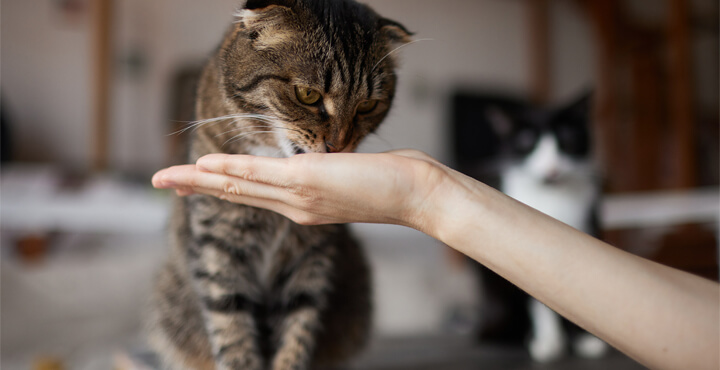
When cats get older, it’s normal for their appetite and eating habits to change with time. Some cats lose interest in the food they once loved, while others want to eat less often than when they were younger.
However, older cats not eating, or eating well but losing weight can be worrying. WHISKAS explains why your older cat might not be eating and offers advice on what to do.
Why isn’t my cat eating?
When cats’ eating habits change, there can be several different explanations.
If your cat is sleeping a lot, this could just be due to old age. Cats naturally slow down as they get older and many prefer to sleep for longer.
However, if your cat is not eating at all, this is a very serious situation and needs urgent medical attention. Weight loss in cats, or a cat that has gone off its food may also be an indication of potential health issues.
If your old cat is losing weight but eating well this could also be the sign of a problem and you should take them to the vet for a health check-up.
What to feed your senior cat
A senior cat’s diet is very important in order to help your cat stay happy and healthy. Your cat needs to eat high quality protein, specific levels of fat and amino acids, and key minerals and vitamins. Food tailored to meet the nutritional requirements of senior cats contains all of the nutrients they need and will also contain ingredients that support their joints and immune system, as well as being easier to digest.
The sense of smell and taste can start to deteriorate as cats become more senior. This means that they may be reluctant to eat and their appetite might not be as strong as it used to be. By choosing senior cat food with high quality ingredients, their food should still smell and taste delicious – and to make it easier for them to chew, you can mash it up with a little water.
WHISKAS senior cat food is specially formulated to support mature cats’ specific needs and appetites. It contains high quality ingredients to help keep older cats happy and active and is packed with taurine, vitamin E and zinc to help maintain a healthy heart, sharp vision, a strong immune system and a healthy, shiny coat. It is also easily digestible.
When to feed your senior cat
As your cat gets older, they no longer get as much exercise and their metabolism slows down. They therefore require less calories and you will need to feed them less food in terms of portion size. If you notice your senior cat putting on weight, this may because you are feeding them too much. As well as weight gain, overfeeding an older cat can contribute to other health issues, including joint problems such as arthritis, UTIs and diabetes.
For senior cats, feeding small portions regularly throughout the day is ideal. A nice way to feed older cats is to offer wet food at meal times and then stimulate them mentally and physically by allowing them to graze on their dry food allocation by placing it in various places around the home.
You should weigh your cat regularly – every 1-2 months – to check there have been no drastic changes to their weight. If you are concerned about your cat losing weight for any reason, you should always seek expert advice from a vet.








